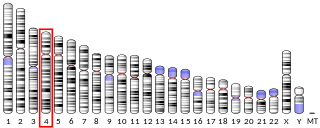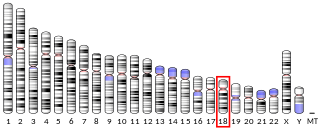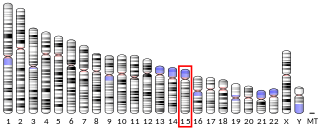
Aurora kinase A also known as serine/threonine-protein kinase 6 is an enzyme that in humans is encoded by the AURKA gene.

Pericentriolar material 1, also known as PCM1, is a protein which in humans is encoded by the PCM1 gene.

Ninein is a protein that in humans is encoded by the NIN gene. Ninein, together with its paralog Ninein-like protein is one of the proteins important for centrosomal function. This protein is important for positioning and anchoring the microtubules minus-ends in epithelial cells. Localization of this protein to the centrosome requires three leucine zippers in the central coiled-coil domain. Multiple alternatively spliced transcript variants that encode different isoforms have been reported.

Dual specificity protein kinase TTK also known as Mps1 is an enzyme that in humans is encoded by the TTK gene.

Pericentrin (kendrin), also known as PCNT and pericentrin-B (PCNTB), is a protein which in humans is encoded by the PCNT gene on chromosome 21. This protein localizes to the centrosome and recruits proteins to the pericentriolar matrix (PCM) to ensure proper centrosome and mitotic spindle formation, and thus, uninterrupted cell cycle progression. This gene is implicated in many diseases and disorders, including congenital disorders such as microcephalic osteodysplastic primordial dwarfism type II (MOPDII) and Seckel syndrome.

Transforming acidic coiled-coil-containing protein 1 is a protein that in humans is encoded by the TACC1 gene.

Transforming acidic coiled-coil-containing protein 3 is a protein that in humans is encoded by the TACC3 gene.

Large tumor suppressor kinase 2 (LATS2) is an enzyme that in humans is encoded by the LATS2 gene.

Cytoskeleton-associated protein 5 is a microtubule-associated protein that in humans is encoded by the CKAP5 gene. It is the homolog of the Xenopus protein XMAP215 and is also known as ch-Tog.

Centriolin is a protein that in humans is encoded by the CNTRL gene. It was previously known as CEP110.

Centrosomal protein of 57 kDa is a protein that in humans is encoded by the CEP57 gene. It is also known as translokin.

Centriolar coiled-coil protein of 110 kDa also known as centrosomal protein of 110 kDa or CP110 is a protein that in humans is encoded by the CCP110 gene. It is a cell cycle-dependent CDK substrate and regulates centrosome duplication. CP110 suppresses a cilia assembly program.

Tudor domain-containing protein 7 is a protein that in humans is encoded by the TDRD7 gene.

Acidic leucine-rich nuclear phosphoprotein 32 family member D is a protein that in humans is encoded by the ANP32D gene.

Centrosomal protein of 72 kDa is a protein that in humans is encoded by the CEP72 gene.

Rootletin also known as ciliary rootlet coiled-coil protein (CROCC) is a protein that in humans is encoded by the CROCC gene. Rootletin is a component of the ciliary rootlet, and, together with CEP68 and CEP250, is required for centrosome cohesion.

Centrosomal protein of 192 kDa, also known as Cep192, is a protein that in humans is encoded by the CEP192 gene. It is the homolog of the C. elegans and D. melanogaster gene SPD-2.

Centrosomal protein of 164 kDa, also known as CEP164, is a protein that in humans is encoded by the CEP164 gene. Its function appears two be twofold: CEP164 is required for primary cilium formation. Furthermore, it is an important component in the response to DNA damage by UV light.

Centrosomal protein of 120 kDa (Cep120), also known as coiled-coil domain-containing protein 100, is a protein that in humans is encoded by the CEP120 gene.

Centrosomal protein of 152 kDa, also known as Cep152, is a protein that in humans is encoded by the CEP152 gene. It is the ortholog of the Drosophila melanogaster gene asterless (asl) and both are required for centriole duplication.




















